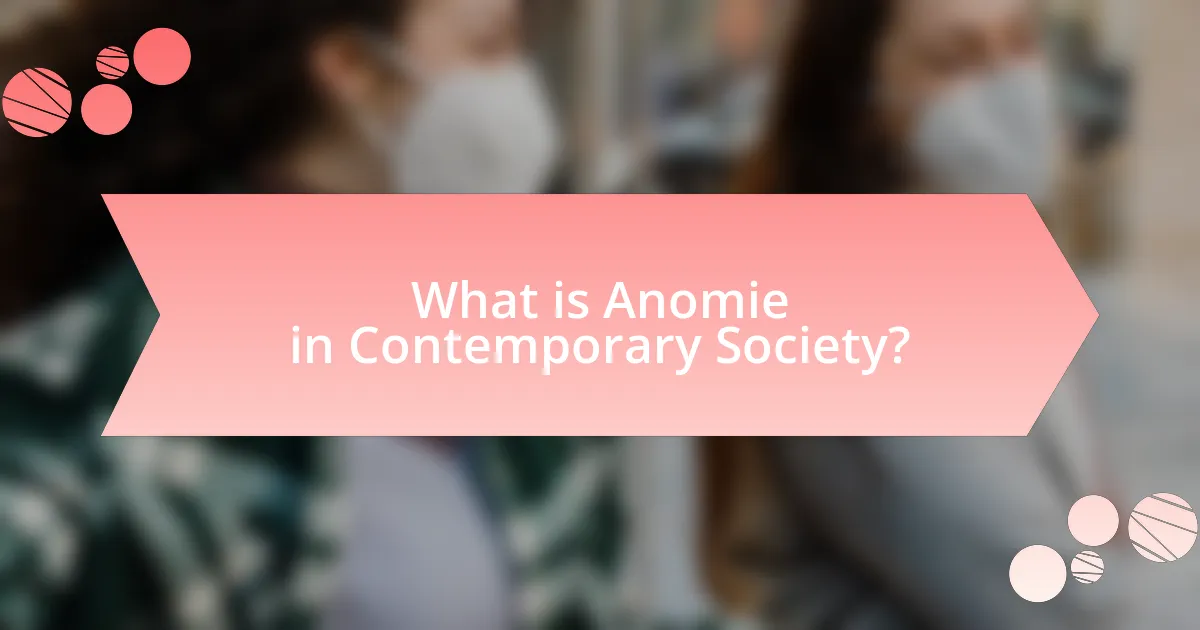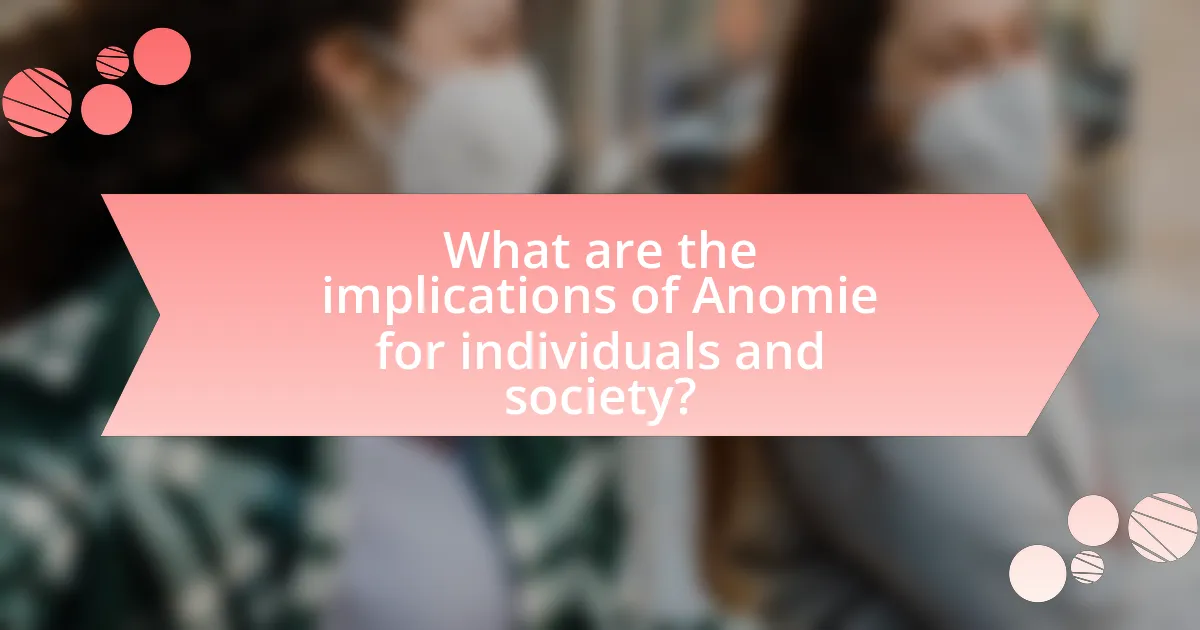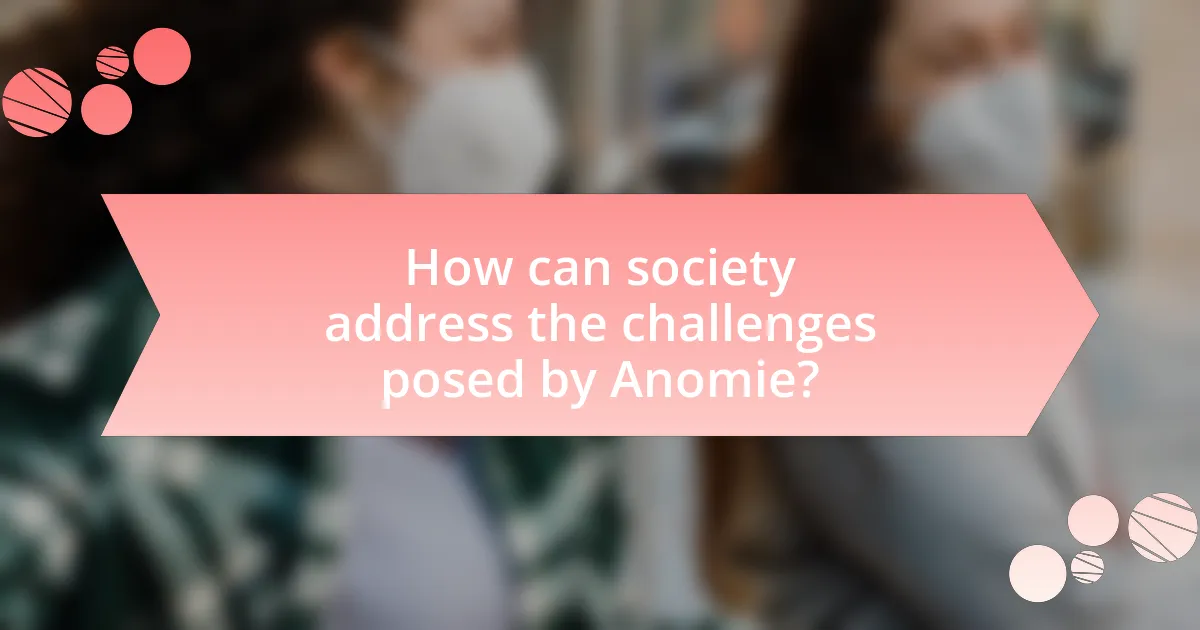Anomie in contemporary society is defined as a state of normlessness where individuals feel disconnected from the collective values and norms of their community, often resulting from rapid social change, economic instability, or cultural shifts. The concept, introduced by sociologist Émile Durkheim, highlights the breakdown of social cohesion and its implications for mental health, social behavior, and crime. This article explores the origins of anomie, its relevance in today’s society, the social changes contributing to it, and its psychological effects. Additionally, it discusses strategies for individuals and communities to combat anomie and the role of social support in fostering resilience.

What is Anomie in Contemporary Society?
Anomie in contemporary society refers to a state of normlessness where individuals feel disconnected from the collective values and norms of their community. This phenomenon often arises during periods of rapid social change, economic instability, or cultural shifts, leading to feelings of alienation and purposelessness among individuals. For instance, research by Emile Durkheim, a foundational sociologist, highlighted that anomie can result from the breakdown of social cohesion, particularly in modern industrial societies where traditional norms are challenged. In contemporary contexts, factors such as globalization, technological advancement, and social media can exacerbate feelings of anomie, as individuals struggle to find their place within an increasingly complex social landscape.
How did the concept of Anomie originate?
The concept of Anomie originated from the work of sociologist Émile Durkheim in the late 19th century. Durkheim introduced Anomie in his 1897 study “Le Suicide,” where he described it as a state of normlessness resulting from the breakdown of social norms and values during periods of rapid social change. He argued that Anomie occurs when individuals feel disconnected from the collective conscience of society, leading to feelings of isolation and purposelessness. This foundational idea has been supported by subsequent sociological research, which highlights how societal upheaval, such as economic crises or shifts in cultural values, can exacerbate feelings of Anomie among individuals.
Who introduced the term Anomie and what was its initial context?
The term “Anomie” was introduced by the French sociologist Émile Durkheim in his work “The Division of Labor in Society,” published in 1893. Initially, the context of anomie referred to a state of normlessness or breakdown of social norms, particularly during periods of rapid social change, where individuals feel disconnected from the collective conscience of society. Durkheim used the concept to explain the social instability and disintegration that can occur when traditional norms and values are undermined, leading to feelings of alienation and purposelessness among individuals.
What are the key characteristics of Anomie as defined by early sociologists?
Anomie, as defined by early sociologists, is characterized by a breakdown of social norms and values, leading to feelings of disconnection and purposelessness among individuals. Émile Durkheim, a key figure in sociology, identified anomie as a condition that arises during periods of rapid social change or upheaval, where traditional norms become unclear or ineffective. This disintegration of social cohesion results in increased individualism and a lack of shared values, which can lead to social instability and higher rates of deviance and suicide, as evidenced in Durkheim’s study of suicide rates in different social contexts.
Why is Anomie relevant in today’s society?
Anomie is relevant in today’s society because it highlights the disconnection and lack of social norms that can lead to feelings of isolation and purposelessness among individuals. In contemporary contexts, rapid social change, economic instability, and cultural shifts contribute to a breakdown of traditional values and norms, resulting in increased rates of mental health issues, crime, and social unrest. For instance, a study by the American Psychological Association found that feelings of social disconnection have risen significantly in recent years, correlating with higher levels of anxiety and depression. This demonstrates that anomie remains a critical framework for understanding the challenges faced by individuals in modern society.
What social changes contribute to feelings of Anomie in contemporary life?
Social changes such as rapid technological advancement, increased individualism, and the decline of traditional social structures contribute to feelings of Anomie in contemporary life. The rise of digital communication has led to a decrease in face-to-face interactions, resulting in social isolation and weakened community bonds. Increased individualism, often promoted by consumer culture, fosters a sense of disconnection from collective values and norms. Additionally, the decline of traditional institutions, such as family and religion, has eroded the social frameworks that once provided stability and a sense of belonging, leading to confusion and a lack of purpose among individuals. These factors collectively create an environment where individuals feel disconnected from societal norms, contributing to feelings of Anomie.
How does Anomie manifest in various social groups?
Anomie manifests in various social groups through a breakdown of social norms and values, leading to feelings of disconnection and purposelessness among individuals. In urban environments, for instance, rapid social change and economic instability can result in individuals feeling alienated from traditional community structures, as evidenced by increased rates of crime and mental health issues. In contrast, within marginalized communities, anomie may emerge from systemic inequality and lack of access to resources, causing individuals to experience hopelessness and disengagement from societal expectations. Research by Emile Durkheim highlights that anomie can lead to higher suicide rates, particularly in societies undergoing significant transitions, illustrating its profound impact across different social contexts.

What are the implications of Anomie for individuals and society?
Anomie leads to feelings of disconnection and normlessness for individuals and can result in increased social instability for society. Individuals experiencing anomie may struggle with identity and purpose, leading to mental health issues such as anxiety and depression. For society, anomie can manifest as higher crime rates, social unrest, and weakened community bonds, as seen in studies that link economic downturns to increased rates of suicide and crime, such as the research by Durkheim in “Suicide” (1897), which established a correlation between social integration and individual well-being.
How does Anomie affect mental health and well-being?
Anomie negatively affects mental health and well-being by creating feelings of isolation, purposelessness, and anxiety. This social condition, characterized by a breakdown of social norms and values, leads individuals to experience a lack of direction and support, which can result in increased rates of depression and anxiety disorders. Research indicates that individuals in anomic conditions report higher levels of psychological distress, as evidenced by a study published in the “American Journal of Sociology,” which found a correlation between anomie and mental health issues among urban populations. The disruption of social cohesion and the absence of shared values contribute to a decline in individual well-being, making it essential to address the societal factors that foster anomie to improve mental health outcomes.
What psychological effects are associated with Anomie?
Anomie is associated with several psychological effects, including feelings of alienation, anxiety, and depression. These effects arise when individuals experience a breakdown of social norms and values, leading to a sense of disconnection from society. Research indicates that individuals in an anomic state often struggle with identity and purpose, which can exacerbate mental health issues. For instance, Emile Durkheim, who introduced the concept of anomie, highlighted its correlation with increased rates of suicide and mental distress in societies undergoing rapid change. This demonstrates that anomie can significantly impact psychological well-being by fostering a sense of hopelessness and lack of belonging.
How can Anomie lead to social disintegration?
Anomie can lead to social disintegration by creating a state of normlessness where individuals feel disconnected from societal values and expectations. This disconnection results in weakened social cohesion, as people no longer adhere to shared norms that promote cooperation and stability. For instance, during periods of rapid social change or economic upheaval, such as the Great Depression, individuals may experience anomie, leading to increased crime rates and social unrest, as evidenced by historical data showing a rise in criminal behavior during such times. This breakdown of social order ultimately contributes to the disintegration of community bonds and collective identity.
What role does Anomie play in social behavior and crime?
Anomie significantly influences social behavior and crime by creating a state of normlessness that leads to increased deviance. When societal norms break down, individuals may feel disconnected from the community, resulting in feelings of alienation and a lack of purpose. This disconnection can lead to higher rates of criminal behavior as individuals seek alternative means to achieve their goals, often resorting to illegal activities. Research by Emile Durkheim, who introduced the concept of anomie, demonstrated that societies experiencing rapid change or upheaval often see a rise in crime rates due to weakened social cohesion and shared values. For instance, during economic downturns, studies have shown that crime rates tend to increase as individuals struggle to adapt to new social realities.
How does Anomie influence deviant behavior?
Anomie influences deviant behavior by creating a state of normlessness where societal norms are unclear or eroded, leading individuals to engage in behaviors that deviate from accepted standards. This concept, introduced by sociologist Émile Durkheim, suggests that when individuals feel disconnected from societal values, they may resort to deviance as a means of coping or expressing frustration. Empirical studies, such as those examining crime rates during economic downturns, demonstrate that increased anomie correlates with higher levels of criminal behavior, as individuals struggle to find meaning and direction in a rapidly changing social landscape.
What are the connections between Anomie and criminal activity?
Anomie is a social condition characterized by a breakdown of social norms and values, which can lead to increased criminal activity. When individuals experience a disconnection from societal expectations, they may resort to deviant behaviors as a means of coping or achieving their goals. Research by Emile Durkheim, who first introduced the concept of anomie, indicates that during periods of rapid social change or economic instability, such as the Great Depression, crime rates tend to rise due to weakened social cohesion and moral guidance. This correlation suggests that anomie creates an environment where individuals feel less constrained by societal rules, thereby increasing the likelihood of engaging in criminal acts.

How can society address the challenges posed by Anomie?
Society can address the challenges posed by Anomie by fostering social cohesion and reinforcing shared values. Initiatives such as community-building programs, educational reforms that emphasize moral and ethical development, and policies that promote social justice can help mitigate feelings of normlessness. Research indicates that communities with strong social ties and active civic engagement experience lower levels of Anomie, as evidenced by studies showing that neighborhoods with robust social networks report higher levels of trust and cooperation among residents. By implementing these strategies, society can create a more integrated and supportive environment that counters the disorientation associated with Anomie.
What strategies can be implemented to reduce Anomie?
To reduce Anomie, strategies such as strengthening community ties, promoting social integration, and enhancing access to education can be implemented. Strengthening community ties involves fostering relationships among individuals through local organizations and activities, which can create a sense of belonging and shared purpose. Promoting social integration includes encouraging diverse groups to interact and collaborate, thereby reducing feelings of isolation and disconnection. Enhancing access to education equips individuals with the skills and knowledge necessary to navigate societal expectations and contribute positively to their communities. Research indicates that communities with strong social networks and educational opportunities experience lower levels of Anomie, as individuals feel more connected and engaged in societal norms and values.
How can community engagement help combat feelings of Anomie?
Community engagement can combat feelings of Anomie by fostering social connections and a sense of belonging among individuals. When people actively participate in community activities, they develop relationships that provide emotional support and a shared identity, which counteracts feelings of isolation and disconnection. Research indicates that communities with higher levels of engagement report lower rates of mental health issues, including feelings of Anomie, as individuals feel more integrated into their social fabric. For instance, a study published in the Journal of Community Psychology found that community involvement significantly correlates with increased life satisfaction and reduced feelings of alienation, demonstrating the positive impact of social ties on individual well-being.
What policies can governments adopt to mitigate Anomie?
Governments can adopt policies that promote social cohesion and community engagement to mitigate Anomie. These policies may include investing in education and job training programs to enhance individual skills and employment opportunities, thereby fostering a sense of purpose and belonging. Additionally, implementing social welfare programs can provide support for vulnerable populations, reducing feelings of isolation and disconnection.
Research indicates that communities with strong social networks and active civic participation experience lower levels of Anomie. For instance, a study by Putnam (2000) in “Bowling Alone” highlights the correlation between social capital and community well-being, demonstrating that increased civic engagement leads to stronger social ties and reduced feelings of normlessness. Therefore, policies that encourage community involvement, such as volunteer programs and local initiatives, can effectively address the root causes of Anomie.
What are some practical steps individuals can take to cope with Anomie?
Individuals can cope with Anomie by establishing strong social connections and engaging in community activities. Building relationships with family, friends, and neighbors fosters a sense of belonging, which counteracts feelings of isolation and disconnection. Participating in local organizations, volunteering, or joining clubs can provide individuals with a support network and a shared purpose, reinforcing social norms and values. Research indicates that social support is crucial for mental well-being, as it helps individuals navigate feelings of uncertainty and instability often associated with Anomie.
How can personal resilience be developed in the face of Anomie?
Personal resilience can be developed in the face of Anomie by fostering strong social connections, enhancing emotional regulation, and cultivating a sense of purpose. Strong social connections provide support and a sense of belonging, which are crucial during times of societal instability. Emotional regulation skills, such as mindfulness and stress management techniques, help individuals cope with feelings of disconnection and uncertainty. Additionally, cultivating a sense of purpose through personal goals or community involvement can provide direction and motivation, countering the feelings of aimlessness associated with Anomie. Research indicates that individuals with a strong sense of purpose are more resilient in the face of adversity, as evidenced by studies showing that purpose-driven individuals report higher levels of well-being and lower levels of anxiety and depression.
What role does social support play in overcoming Anomie?
Social support plays a crucial role in overcoming anomie by providing individuals with a sense of belonging and connection, which counteracts feelings of isolation and normlessness. Research indicates that social support can enhance resilience, enabling individuals to cope with the disorientation associated with anomie. For instance, studies have shown that strong social networks can lead to improved mental health outcomes and a greater sense of purpose, which are essential in mitigating the effects of anomie. Furthermore, social support fosters community engagement and collective action, which can restore social norms and cohesion, thereby addressing the root causes of anomie.
